Restoring Dignity
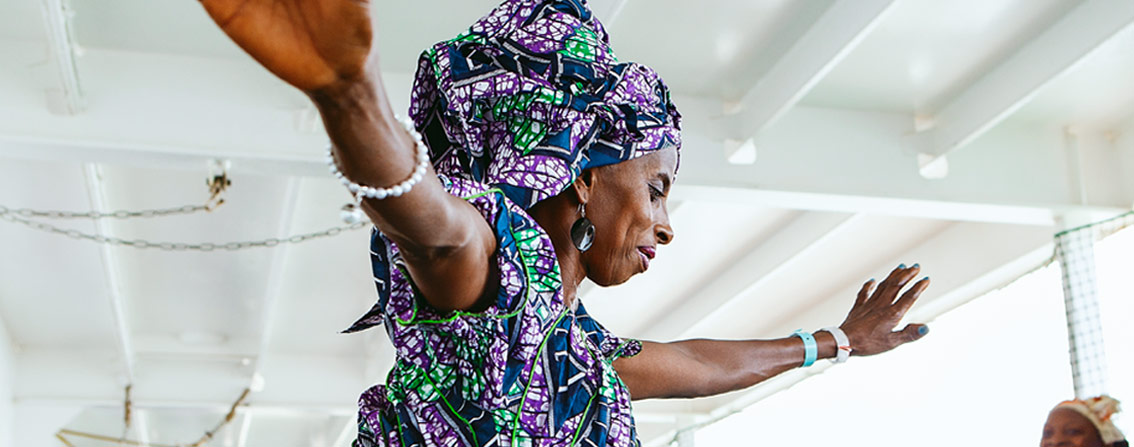
Without access to routine medical or surgical care during and after delivery, many young women suffer injuries during childbirth, usually occurring during prolonged or difficult labours.
This was Gisele’s story.
In 1993 Gisele was 28 years old, married and expecting a baby. Following a miscarriage with her first pregnancy, this baby was perhaps even more precious. She was elated with the anticipation of motherhood and the thought of building a family with her husband. Having children was all Gisele had ever wanted; it was the reason she believed she was here on this earth. Motherhood was within reach.
But during a prolonged obstructed labour in her Congolese village in 1993, Gisele lost her baby. Owing to the trauma of the delivery, she developed a condition called obstetric fistula, also called vesicovaginal fistula (VVF). VVF is a childbirth injury that creates a hole between the birth canal and urinary tract, leaving the mother incontinent. For 20 years, Gisele lived with a steady stream of urine trickling down her legs.
Managing her incontinence was difficult because she could not escape the smell. Her damp skirt and wet legs reminded her of the child she lost and of the children she would never have. In the night, she had to wake up hourly to change out of her wet clothes. Gisele’s husband, realising that she would probably never have children, decided to leave. He still wanted a family, he told her, adding bluntly: “And, with you, I am wasting my time.”
While the nature of Gisele’s condition was terrible, her physical pain was now nothing compared to the emotional burden that came with her husband’s public rejection. In her failed attempts at motherhood, she grieved her life’s purpose. In her failed marriage, her fear was confirmed – to be a woman unable to have children was to have no value.
Gisele withdrew into a life of solitude. And she was far from alone. There are more than two million women in sub-Saharan Africa and Asia who live with VVF, according to the World Health Organisation. In much of the developing world, basic obstetric care is inaccessible. Women must live with, or die from, the consequences of unattended childbirth.
With surgery, obstetric fistula is often repairable. As news spread around the Republic of Congo that Mercy Ships was coming, Gisele began to hope. But she tried not to get her hopes up; she had been let down too many times before. It was not until she found herself sitting on a hospital bed in the port of Pointe-Noire waiting for surgery that she allowed herself to believe that she might be healed.
Since her surgery, Gisele is all smiles. Gisele is glowing.
While surgery fixed Gisele physically, it cannot make her a mother. However, she has found something else onboard the Africa Mercy. She has found emotional restoration in the attentive way Mercy Ships doctors, nurses and other caring volunteers provided a holistic approach to treatment – showering her with loving acceptance.
When it comes time to discharge fistula patients, the volunteer crew throws a going-away party called a Dress Ceremony. Each patient is presented with a new dress, which she will wear as she goes home. On the morning of Gisele’s celebration, the women gathered in the ward to do their make-up and fasten their head wraps. The room filled with chatter, smiles and an energy like that of a bridal party.
After the celebration was over, Gisele walked out of the hospital, down the dock, and took her first step back into society.
Gisele may always carry with her the grief of the child she lost and the pain of the years of suffering, but she will carry it with her head held high, because she knows the truth. She knows her worth. Her dignity has been restored.
Learn more about the Women’s Health Program >>
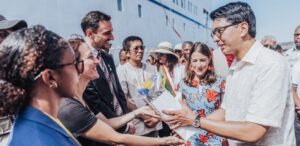
Mercy Ships Welcomes Presidential Visit on board, in Toamasina Harbor
Presidential Visit: Malagasy president His Excellency Andry Nirina Rajoelina visited patients and volunteers on board Mercy Ships’ hospital vessel to see for himself the lives being transformed.
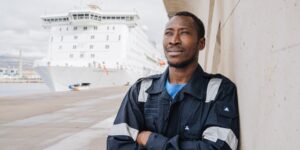
Day of the Seafarer: One Maritime Volunteer’s Story
On this Day of the Seafarer, Mercy Ships wants to honor all the people like Ishaka, volunteer assistant bosun on board the Global Mercy.
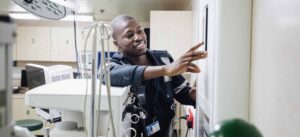
An Electrician’s Journey to Finding Purpose and Professional Growth
When Jean Jacques Diouf came on board for the 1st time, he’d packed his suitcase with enough supplies for one week. Learn more about his professional growth!
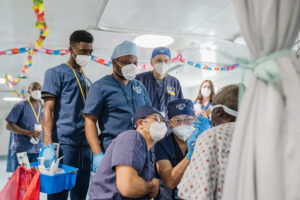
THE MSC FOUNDATION, THE MSC GROUP AND MERCY SHIPS INTERNATIONAL JOIN FORCES TO BUILD A NEW HOSPITAL SHIP
The new purpose-built hospital ship will expand the impact of Mercy Ships’ life-changing surgeries, anaesthetic care and surgical education for future generations of patients and healthcare professionals in sub-Saharan Africa.
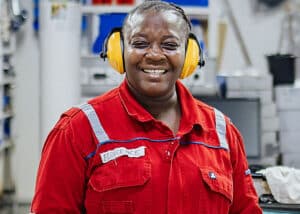
The Woman Who Forged Her Way Through Walls: Florence Bangura’s Story
Florence’s journey from oldest to newest Mercy Ship came full circle when she met the Global Mercy™ in 2023, the same year that the purpose-built hospital ship began welcoming its patients on board. Today, you can find Florence, now 49 years old, down in the engine room as a hotel engineering assistant.
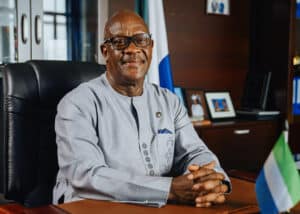
Transforming Sierra Leone’s Healthcare: A Vision for Safe and Affordable Surgery
As experts from the surgical and healthcare world gather for the 64th Annual Conference and Scientific Meeting of the West African College of Surgeons in Sierra Leone this week, a profound dedication to advancing surgical knowledge and practice in the region is palpable. At the forefront of discussions lies the conference’s pivotal theme: access to safe and affordable surgical and anesthetic care in West Africa. This theme highlights the pressing need to address disparities in healthcare capabilities and capacities across the region, especially the critical importance of equitable access to quality surgical interventions.
Share
Related Posts
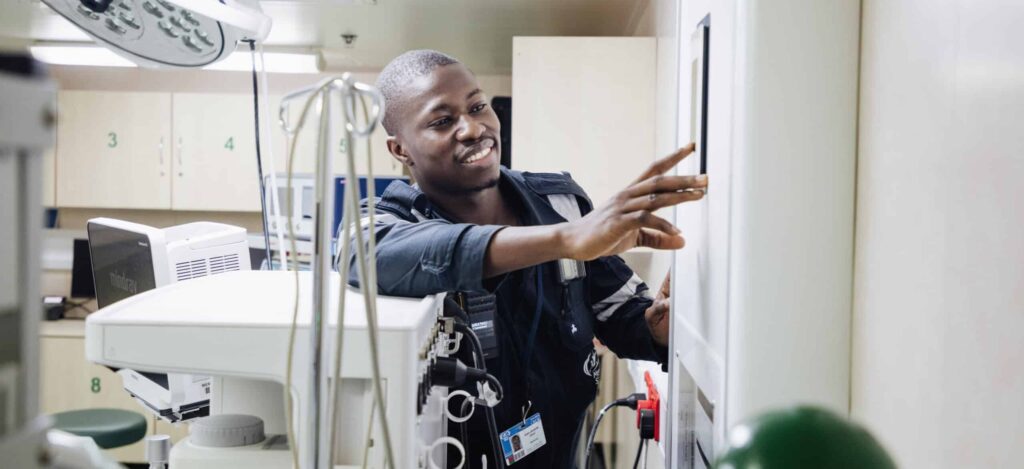
An Electrician’s Journey to Finding Purpose and Professional Growth
When Jean Jacques Diouf came on board for the 1st time, he’d packed his suitcase with enough supplies for one week. Learn more about his professional growth!
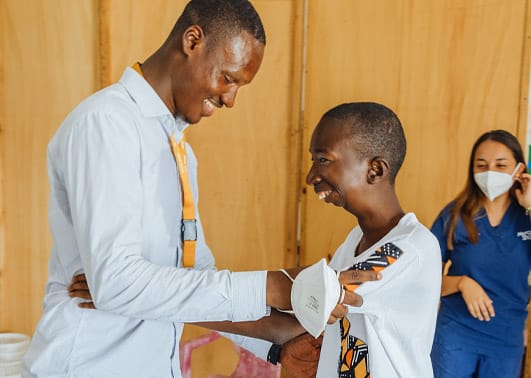
How the Mercy Ships National Crew Took on the COVID-19 Pandemic in Senegal
On a hospital ship when the pandemic hit, a member of Mercy Ships National Crew was inspired to continue humanitarian work in Senegal.
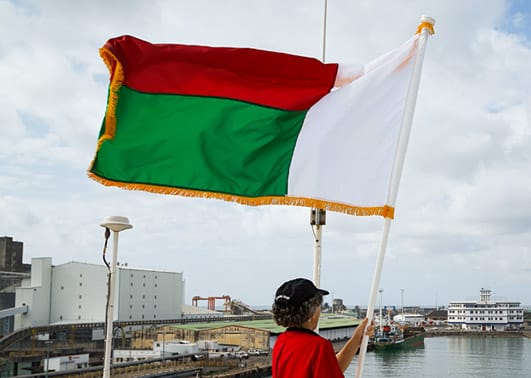
Madagascar Welcomes Mercy Ships for Next Field Service in 2024
Following a series of recent meetings between the Ministry of Health and Mercy Ships, the Africa Mercy has officially been welcomed to return to Madagascar for her next field service. The hospital ship is planned to initially dock in the port of Toamasina in February 2024.
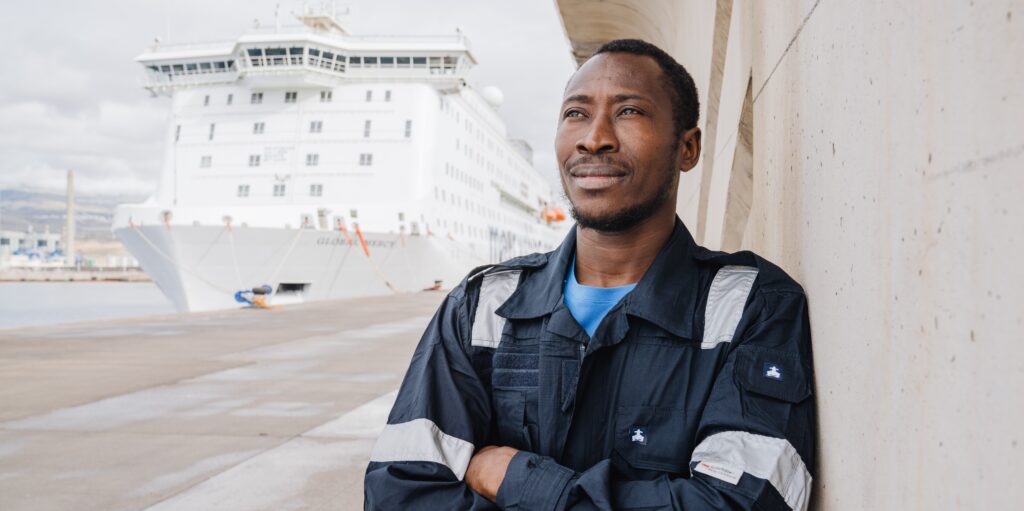
Day of the Seafarer: One Maritime Volunteer’s Story
On this Day of the Seafarer, Mercy Ships wants to honor all the people like Ishaka, volunteer assistant bosun on board the Global Mercy.
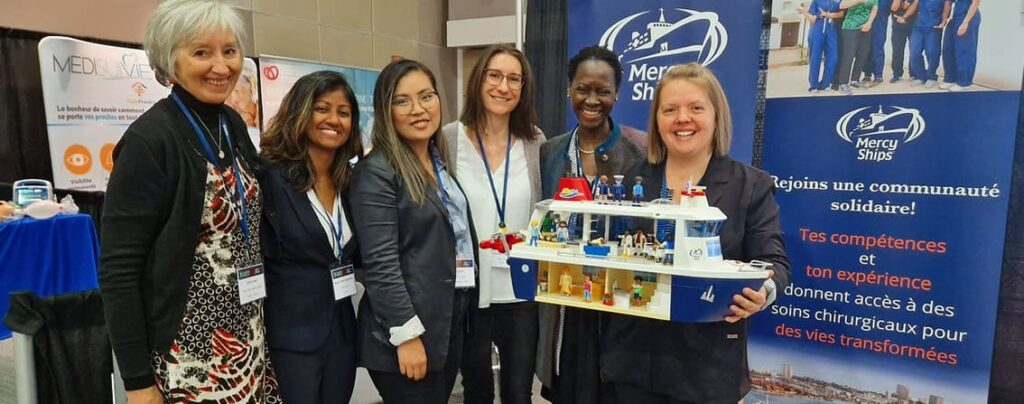
Creating New Connections: Mercy Ships Canada and the Francophone Nursing Community
Find out how Mercy Ships Canada is getting involved with the French speaking nursing community.
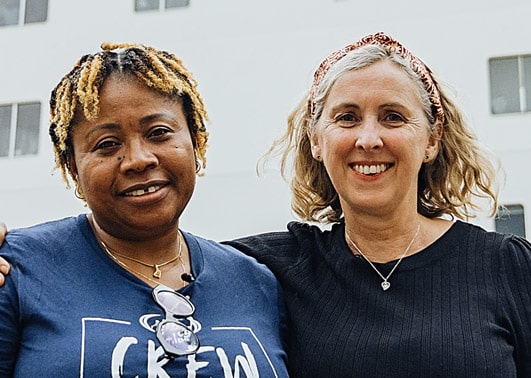
Face-to-Face after Decades: Catherine and Aly Reunite on the Global Mercy
The last time Catherine Conteh saw the deeply familiar smile in front of her in Freetown, it was under dramatically different circumstances. Learn more about Aly’s act of kindness!
